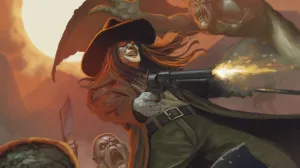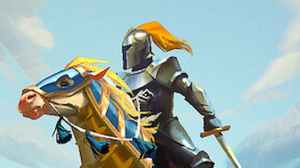The latest project from Doug Liman, the filmmaker behind The Bourne Identity and Swingers, is Impulse — a sci-fi/drama series based on the novel by Stephen Gould, and streaming on YouTube Premium. With ecstatic reviews, the series has managed to join Cobra Kai as some of the only YouTube Premium content to make a mainstream splash. It starts Sarah Desjardins, Missi Pyle, Maddie Hasson, Enuka Okuma, Craig Arnold, Tanner Stine, and Keegan-Michael Key. It is, like Liman’s film Jumper (which is set in the same world and based on stories by Gould as well), centered around a group of young people who have super powers, but don’t elect to become traditional superheroes and supervillains.
Videos by ComicBook.com
Per its official description, Impulse follows 16-year-old Henrietta “Henry” Coles who discovers she has the ability to teleport but has no control over her destination. The first time she realizes this, she is in a truck with her high school’s basketball captain and star, Clay Boone, who tries to rape her. She has a seizure and teleports, in the course of which she inadvertently crushes much of his truck when her ability to teleport first manifests, leaving him a paraplegic. The show goes on to explore Henry’s need to reconcile what her assailant tried to do with the consequence, and her feelings about discovering she can teleport and psionically move objects from a distance, which are triggered by her feelings of fear regarding the assault.
Liman recently joined ComicBook.com to discuss the series, which is in its second season on YouTube.
With streaming services, there are no ratings numbers. Is it a relief to be in season 2 and to know more or less how the audience is responding?
You’re right, first of all, about this whole thing of being on a streaming platform where it’s proprietary data how many people are actually watching it. You’re trying to gauge your executives’ mood just to figure out how you’re doing. When your show has the critical response that Impulse got — we were 100% on Rotten Tomatoes, and I’ve never had anything 100% — that gives you some indication. You’re also hoping, because you actually have no idea if anyone’s watching, “Well, hopefully they’ll bring it back if for no other reason than it’s their [best-reviewed] show.”
The thing that I discovered, because it’s my first show for streaming, is that actually, unlike more traditional television, being on YouTube gave me the kind of feedback I was used to getting when I put movies in theaters. Part of what I love so much about making movies for the big screen is that I had to go and attend my own movies, when they’re open to the public. I just sit quietly in the back, and I get to see real people experiencing my films and get their reactions while they’re watching the movie, loiter around the restroom afterwards, because people tend to talk in the restroom about the film they just saw. That feedback’s really important to me, to my filmmaking process, and for my growth as a filmmaker. What I discovered with Impulse was that I was getting that in real time because people are leaving comments, so I knew a lot of people were watching because of the comments stream that I was getting. This is my first time getting that kind of feedback in television.
When I make something like Impulse, I’m thinking about the audience the whole time, and wanting to deliver something they’ve never seen before. My goal — my narrow target I aim for, whether it’s TV or film — is something that’s completely original, that delivers the emotional satisfaction of big budget commercial filmmaking, but does it in some way that’s completely unexpected. That’s from Bourne Identity, where the studio had no idea what to make of the film, and I had done with it, because it just didn’t look like any kind of spy movie that anyone’s ever seen before — but it obviously satisfied an audience just in an original way.
That’s been a thing I’ve aimed for. With Impulse, yeah, it deals with superpowers, but not like anything else out there, and that I really have to credit Lauren LeFranc. It’s really been an incredible collaboration, because she joined the show after the pilot. It’s based on a book. In the book, the superpower comes from her having a snowboarding accident, and we ended up changing it to her having been sexually assaulted. This was before the #MeToo Movement. It wasn’t like we were like, “Oh, this is trendy.”
I just think things show up in the zeitgeist. The same way I was making Swingers, and swing dancing is suddenly being talked about. It’s not because of the movie. It’s just like…the same reason I was making a movie about it, is why people were thinking about it.
Sexual harassment suddenly was something that I was thinking about. Obviously also, other people are thinking about it, and starting to speak up. What Laura did with that is, she brought a level of emotion that you just don’t see in projects with super powers. Where I had started Impulse with this premise that I felt like I never quite made good on Jumper: how come when someone gets a super power, they suddenly become a superhero? Why is that? That just doesn’t seem honest to me, and I wanted to explore that if you get a superpower, it’s just going to amplify all of your impulses, good and bad.
I never quite got that right on Jumper, which is why I wanted to go back to the Jumper world. Lauren took it so much further….She actually made me go back because I shot the pilot, and she saw the pilot and loved it and she pitched through the series, and she said, “I want you to go back and re-shoot the sexual assault scene because you kind of wimped out. You didn’t show all of the connected pieces,” which is true because I didn’t want to see them. It made me uncomfortable.
Lauren was like, “No. We need to be uncomfortable. We need to understand that the reason she’s teleporting away is because her mind has already left, and then that the scars from that incident needs to be married to her superpower from that point forward.” That, to me, is everything I’ve ever strived for in film, in television. I believe in putting people in extraordinary situations, because I want to see how real people would react in those situations. My projects, we have some level of grounding. The humanity of them is real and grounded, no matter how outrageous the premise.
I think that for a show where there’s super powers, it is as intimate a look into adolescence and all the issues that can come with being a young woman, a really serious look at that. The superpowers, in a way, allow you to do that in a broadly entertaining way the same way that Mr. and Mrs. Smith allows you to look at issues of marital fidelity, but you don’t even realize that’s what you’re looking at. You’re just having fun but afterwards, you feel like the calories weren’t empty. There was a real thought process going in here. I feel like what Lauren’s done with the writing of Impulse, it’s a real thinking person show, but it’s also really fun. If you don’t want to think, you don’t have to.
Do you feel like the marriage of peak TV and the dominance of superhero storytelling give you more freedom to swing for the fences here than you had with Jumper? I feel like you’re one of those filmmakers who’s always trying to subvert that and make sure that audiences don’t always know what they’re getting.
Yeah, for sure, including me sometimes. I’m constantly pushing myself, and if I succeeded at something, I never want to do it again. It’s kind of crazy. I’m somebody who seeks adventure in all aspects of life: personal adventure guide, whitewater rafting trips. I fly airplanes and go mountain climbing and go caving. I’m always looking for adventure. What’s through that door? What’s down that passageway? I’m the same with my filmmaking. I want it to be an adventure, and part of that adventure is not necessarily knowing what’s through that door, because I’m going to go through it anyhow.
Is the more commercial side of the superhero stuff something that still holds any appeal for you, or is this scratching that itch?
No, I really think that in a way, essentially the Marvel films have moved to a more grounded place in some regard, so I feel like Kevin Feige also gets that the reason we go see these things is because at some point, there’s a human in there that we’re connecting to, the human in an extraordinary situation. So it wouldn’t surprise me if one day I did a proper superhero film, but for sure, I would inevitably turn it on its head and especially with so many superhero films have to be like, “How do I make mine just different from everybody else’s? What am I going to do with this superhero?”
When I was doing Bourne Identity, I didn’t know what it was going to be when I first started. I just said it’s not going to be James Bond. I sat there with my crew every day and I was like, “We’re mapping out. Okay. Then, what is the movie? I know what it’s not, and I’m going to find my own lane.” If it can be in James Bond, it’s not in Bourne, and now let’s go find something.” That’s how I live my life, and it was definitely how I approach film and television.
In some ways, you created something original with Swingers that will have as much endurance as most of these IPs that you’ve worked on.
Yeah. I’m still very interested in, “Can you make the one off movie or one off TV show? Does it have to be based on some existing IP, and can you raid the IP?” For me, that’s the achievement. That’s when I feel like Bourne Identity is not really based on Robert Ludlum’s novel. It’s a totally original story that I came up with. I show a lot of pride and ownership in having created a world that I can enter. Like Impulse, I feel like we basically create our own worlds, separate from what Steven Gould wrote into the novel, as opposed to Jumper, which is way more faithful to the novel Jumper than Impulse because we had to build a world that could run for years. It’s not that I didn’t love Stephen Gould’s work, but you’re like, “If we have to build something that can run for years, we’ve got to start from scratch.”
Bourne Identity, the novel was totally useless as a road map in the year 2000, because it involved events that were just no longer relevant. I had to start from scratch. That, to me, I think is the ultimate satisfaction. You sort of create a world, and there’s probably not a filmmaker out there who doesn’t look up to George Lucas and go, “That guy created a world. That’s the holy grail.” I’m doing smaller versions of that, and constantly with that as the guiding north star of what it looks like, what’s possible that a filmmaker can create?
At the end of the day, the world I’d built out in Bourne was very much built from our world, and Lucas just invented a whole new world. Impulse is a step in that direction, because with super powers, it also gives us a chance to build out a world that doesn’t exist on the Earth we all know.
In all these franchises, have you ever had struggles with the fans of the source material being frustrated with how many liberties you’ve taken?
I haven’t done an adaptation of Harry Potter, or something that really has rabid fans. Right now, I’m doing a film called Chaos Walking with Daisy Ridley and Tom Holland, and it’s based on a young adult novel by Patrick Ness. I do think that the people who’ve read the novel who are going to go see the movie a little bit more in the case of Chaos Walking, than maybe in the case of Bourne, since the book was so old. And like, Impulse came out a long time ago. Sometimes I go to a studio about optioning a book, and then I pitch what I’m going to do, and they’re like, “Why even bother buying the book? Let’s just do your story. You haven’t kept anything from the book. You kept some kind of spark from it.”
I guess the answer is yeah, I really recognize that movies and TV are different format than a book, and I got really lucky in the case of Bourne Identity, because the person that we hired to adapt it never read the novel. I was just describing to him reading the novel I loved, and he didn’t get it because he didn’t have the seven hours of reading the novel to set up that scene. He was able to be way more objective about what could and could not be kept from the novel, and that’s how we ended up just building out a whole new world. I really learned early on in my career that movies are a two-hour format and novels are five to 20 hours to read, so by definition, you’ve got to reinvent it. You can’t just do the shortened version of every scene from the novel. It won’t have any emotional impact.
Impulse is on YouTube Premium. The second season landed on October 16.








